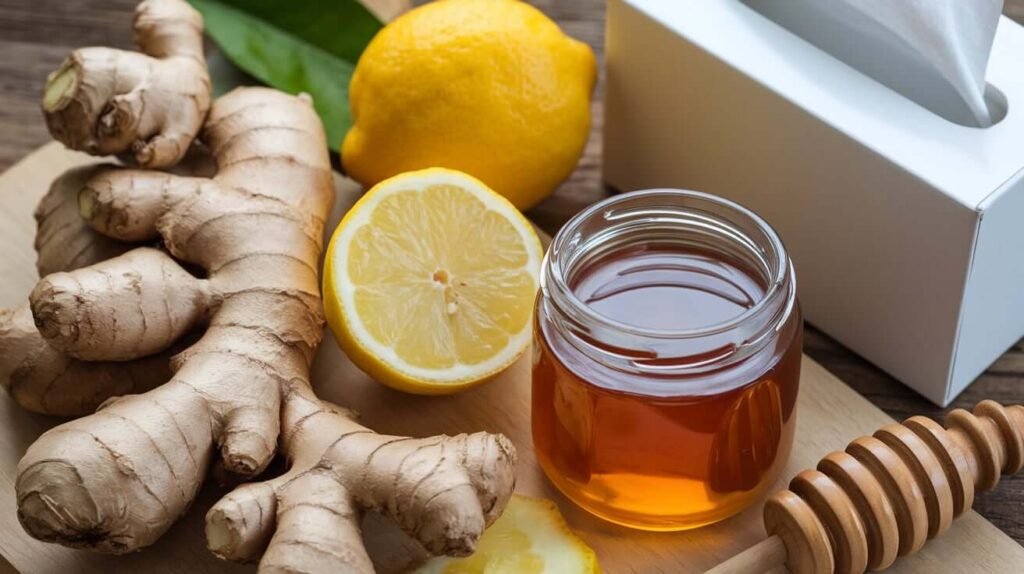Physical Address
304 North Cardinal St.
Dorchester Center, MA 02124
Physical Address
304 North Cardinal St.
Dorchester Center, MA 02124


A runny nose is a common and often frustrating symptom that can occur due to various reasons, including colds, allergies, sinus infections, and environmental factors. While over-the-counter medications offer relief, many individuals prefer to explore natural remedies for a runny nose due to their gentle yet effective nature. These remedies help manage symptoms without the side effects that sometimes accompany conventional treatments.
This guide will explore the causes of a runny nose, provide tips for coping with it, and delve into various homemade natural remedies for runny nose that can offer comfort and relief. Additionally, we’ll discuss how long a runny nose typically lasts, when to see a doctor, and answer common questions about natural remedies for this condition.
A runny nose, medically known as rhinorrhea, occurs when the nasal tissues produce excess mucus, leading to a watery or thick discharge from the nostrils. This can be due to several factors, including viral infections like the common cold, allergic reactions to pollen or pet dander, exposure to environmental irritants, or even sudden temperature changes.
While a runny nose is rarely serious, it can be uncomfortable and disruptive. Fortunately, there are numerous natural ways to stop a runny nose using herbs, essential oils, teas, and other natural ingredients. These methods are not only effective but also easy to prepare with ingredients you likely already have at home.
In this article, we will explore both simple and comprehensive remedies to help you find relief from your symptoms, as well as tips for when it’s necessary to seek medical attention.

Before diving into specific remedies, here are some general tips for managing and coping with a runny nose. These strategies will help you find relief and improve your overall comfort.
Staying hydrated is essential for thinning mucus, making it easier for your body to expel. Drinking plenty of water, herbal teas, and broths can help prevent dehydration, which can otherwise cause the mucus to thicken, worsening nasal congestion. Avoid beverages that can dehydrate you, such as caffeine and alcohol.
Does steam help runny noses? Yes, steam inhalation is one of the most effective natural ways to stop a runny nose. Inhaling steam helps loosen thick mucus, making it easier to clear your nasal passages. You can achieve this by taking a hot shower or filling a bowl with boiling water, covering your head with a towel, and inhaling the steam for 10-15 minutes. For added benefit, you can add essential oils like eucalyptus or peppermint, which act as natural decongestants.
Dry air can irritate your nasal passages and worsen a runny nose. Using a humidifier in your bedroom or living space can help add moisture to the air, which soothes your nasal passages and reduces mucus production. This is especially useful in colder months when indoor air tends to be drier.
Saline nasal rinses are a highly effective and easy-to-use remedy for clearing out excess mucus, allergens, and irritants from your nasal passages. You can either purchase a saline spray at a pharmacy or make your own solution by mixing salt and distilled water. Using a neti pot or nasal spray bottle, gently rinse your nasal passages for quick relief from congestion.
A warm compress applied to the face can help relieve sinus pressure and promote the drainage of excess mucus. Soak a clean washcloth in warm water, wring it out, and place it over your nose and sinuses for 10-15 minutes. Repeat as needed for relief.
If your runny nose worsens at night, try sleeping with your head elevated. Use an extra pillow to prop up your head and neck, which will help prevent mucus from pooling in your nasal passages while you sleep.
Certain essential oils, such as eucalyptus, peppermint, and tea tree oil, have natural decongestant and anti-inflammatory properties. You can diffuse them in your room, add a few drops to a bowl of hot water and inhale the steam, or apply diluted oils to your chest and neck for ongoing relief.
A runny nose is usually a symptom of a mild condition, such as a cold or allergies, and can often be treated at home. However, there are instances when medical attention may be necessary. If your runny nose persists for more than 10 days, is accompanied by a high fever, or you experience thick green or yellow mucus, facial pain, or difficulty breathing, it’s important to see a doctor.
These symptoms could indicate a bacterial infection, sinusitis, or another underlying condition that may require prescription medications or antibiotics.
Additionally, if you experience severe headaches, swelling, or breathing difficulties, it’s essential to seek medical care promptly. Allergic reactions that include hives or swelling may require immediate attention.

A runny nose can be caused by a variety of factors. Understanding the underlying cause can help you choose the most effective treatment for your symptoms. Below are the most common causes of a runny nose.
The common cold and flu are among the most frequent causes of a runny nose. When your body fights off a viral infection, it produces more mucus to trap and expel the virus. This increased production of nasal secretions results in a runny nose, coughing, and sneezing.
Allergic rhinitis, commonly known as hay fever, is another common cause of a runny nose. Allergens such as pollen, pet dander, dust mites, or mold trigger your immune system to release histamines, which causes the nasal tissues to swell and produce more mucus. Along with a runny nose, allergies often cause sneezing, itching, and watery eyes.
Exposure to environmental irritants like smoke, pollution, and strong odors can irritate the nasal passages, leading to excess mucus production. These irritants cause your body to produce mucus as a protective measure to flush out harmful particles.
Cold weather, especially during winter, can cause a runny nose. This condition, known as “cold-induced rhinitis,” occurs when the cold air irritates the nasal lining, causing your body to produce more mucus to warm and humidify the air before it enters your lungs.
Sinus infections, or sinusitis, can cause a persistent runny nose, often accompanied by thick, discolored mucus. Sinus infections can also lead to facial pain, pressure, and nasal congestion. In some cases, medical intervention is necessary to treat sinusitis, particularly if the infection is bacterial.
The duration of a runny nose depends on its underlying cause. If it’s due to a cold or flu, symptoms typically last 7-10 days. If allergies are the cause, the symptoms may persist for as long as you are exposed to the allergen. In the case of sinus infections, a runny nose may last several weeks, and medical treatment may be necessary if symptoms do not improve with home remedies.
If your runny nose lasts longer than two weeks or seems to worsen over time, it’s important to consult a healthcare provider for further evaluation.

Yes, steam therapy is one of the most effective natural remedies for runny nose. Steam helps to loosen mucus and clear nasal passages, making it easier for you to breathe. It also adds moisture to dry nasal passages, which reduces irritation.
To do steam therapy at home:
Steam therapy is especially effective for runny noses caused by colds, sinus infections, and allergies.

Yes, ginger tea is a well-known natural remedy for a runny nose. Ginger has powerful anti-inflammatory, antiviral, and immune-boosting properties that help reduce nasal inflammation and fight off infections. Drinking a warm cup of ginger tea can soothe your throat, thin mucus, and alleviate nasal congestion.

Herbs have been used for centuries as natural remedies for various ailments, including respiratory issues like a runny nose. Below are some of the best herbs to use for natural relief for runny nose symptoms.
Peppermint contains menthol, which acts as a natural decongestant. Drinking peppermint tea or inhaling peppermint steam can help open up the nasal passages, allowing you to breathe more easily. Peppermint also has antiviral and antibacterial properties, making it effective against infections.
Eucalyptus oil is well-known for its anti-inflammatory and decongestant properties. Inhaling eucalyptus steam or using it in a diffuser can help clear nasal congestion and reduce mucus production. You can also apply diluted eucalyptus oil to your chest to help ease breathing.
Chamomile has natural anti-inflammatory and soothing properties that can help relieve nasal irritation. Drinking chamomile tea or inhaling its steam can reduce mucus production and provide a calming effect on the body, which is helpful when you’re feeling unwell.
Thyme is a potent herb with antimicrobial and expectorant properties, making it useful in treating respiratory infections and nasal congestion. Drinking thyme tea or using thyme essential oil in a steam inhalation can help clear a runny nose and improve breathing.

Yes, drinking warm fluids is an effective way to alleviate a runny nose. Warm liquids like herbal teas, broths, and warm water help thin mucus, making it easier for your body to expel. They also soothe the throat, which can become irritated from constant nasal drainage.
Herbal teas such as ginger, peppermint, and chamomile are particularly beneficial for relieving symptoms and promoting overall respiratory health.
A runny nose can be uncomfortable, but there are plenty of natural remedies for runny nose that provide safe, effective relief without the need for medications. From steam therapy and saline rinses to drinking herbal teas and using essential oils, these natural methods can help you manage your symptoms and improve your overall well-being.
If your runny nose persists for more than two weeks or is accompanied by other severe symptoms, it’s important to consult a healthcare provider for further evaluation and treatment.
A runny nose caused by a cold or flu typically lasts 7-10 days. If allergies are the cause, symptoms may last as long as you are exposed to the allergen.
Yes, steam helps thin and loosen mucus, making it easier to expel from your nasal passages. It also moisturizes dry nasal passages, providing relief from irritation.
Yes, ginger tea has powerful anti-inflammatory and antiviral properties that help reduce nasal inflammation and ease congestion.
Herbs like peppermint, eucalyptus, chamomile, and thyme are excellent for reducing nasal congestion and providing relief from a runny nose.
By using these natural remedies for a runny nose, you can effectively manage your symptoms and support your body’s natural healing processes.